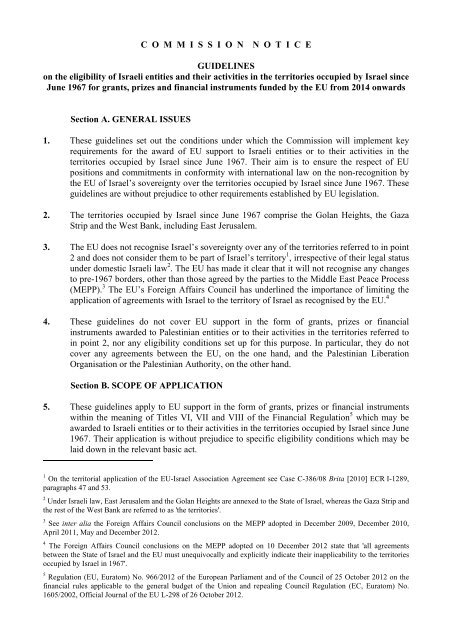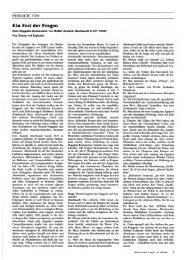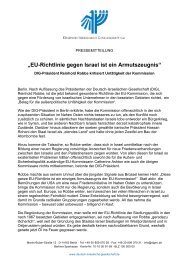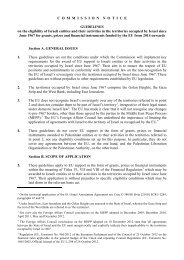EU ZU ISRAEL 17.7.2013.pdf
Create successful ePaper yourself
Turn your PDF publications into a flip-book with our unique Google optimized e-Paper software.
C O M M I S S I O N N O T I C E<br />
GUIDELINES<br />
on the eligibility of Israeli entities and their activities in the territories occupied by Israel since<br />
June 1967 for grants, prizes and financial instruments funded by the <strong>EU</strong> from 2014 onwards<br />
Section A. GENERAL ISSUES<br />
1. These guidelines set out the conditions under which the Commission will implement key<br />
requirements for the award of <strong>EU</strong> support to Israeli entities or to their activities in the<br />
territories occupied by Israel since June 1967. Their aim is to ensure the respect of <strong>EU</strong><br />
positions and commitments in conformity with international law on the non-recognition by<br />
the <strong>EU</strong> of Israel’s sovereignty over the territories occupied by Israel since June 1967. These<br />
guidelines are without prejudice to other requirements established by <strong>EU</strong> legislation.<br />
2. The territories occupied by Israel since June 1967 comprise the Golan Heights, the Gaza<br />
Strip and the West Bank, including East Jerusalem.<br />
3. The <strong>EU</strong> does not recognise Israel’s sovereignty over any of the territories referred to in point<br />
2 and does not consider them to be part of Israel’s territory 1 , irrespective of their legal status<br />
under domestic Israeli law 2 . The <strong>EU</strong> has made it clear that it will not recognise any changes<br />
to pre-1967 borders, other than those agreed by the parties to the Middle East Peace Process<br />
(MEPP). 3 The <strong>EU</strong>’s Foreign Affairs Council has underlined the importance of limiting the<br />
application of agreements with Israel to the territory of Israel as recognised by the <strong>EU</strong>. 4<br />
4. These guidelines do not cover <strong>EU</strong> support in the form of grants, prizes or financial<br />
instruments awarded to Palestinian entities or to their activities in the territories referred to<br />
in point 2, nor any eligibility conditions set up for this purpose. In particular, they do not<br />
cover any agreements between the <strong>EU</strong>, on the one hand, and the Palestinian Liberation<br />
Organisation or the Palestinian Authority, on the other hand.<br />
Section B. SCOPE OF APPLICATION<br />
5. These guidelines apply to <strong>EU</strong> support in the form of grants, prizes or financial instruments<br />
within the meaning of Titles VI, VII and VIII of the Financial Regulation 5 which may be<br />
awarded to Israeli entities or to their activities in the territories occupied by Israel since June<br />
1967. Their application is without prejudice to specific eligibility conditions which may be<br />
laid down in the relevant basic act.<br />
1<br />
On the territorial application of the <strong>EU</strong>-Israel Association Agreement see Case C-386/08 Brita [2010] ECR I-1289,<br />
paragraphs 47 and 53.<br />
2 Under Israeli law, East Jerusalem and the Golan Heights are annexed to the State of Israel, whereas the Gaza Strip and<br />
the rest of the West Bank are referred to as 'the territories'.<br />
3<br />
See inter alia the Foreign Affairs Council conclusions on the MEPP adopted in December 2009, December 2010,<br />
April 2011, May and December 2012.<br />
4 The Foreign Affairs Council conclusions on the MEPP adopted on 10 December 2012 state that 'all agreements<br />
between the State of Israel and the <strong>EU</strong> must unequivocally and explicitly indicate their inapplicability to the territories<br />
occupied by Israel in 1967'.<br />
5 Regulation (<strong>EU</strong>, Euratom) No. 966/2012 of the European Parliament and of the Council of 25 October 2012 on the<br />
financial rules applicable to the general budget of the Union and repealing Council Regulation (EC, Euratom) No.<br />
1605/2002, Official Journal of the <strong>EU</strong> L-298 of 26 October 2012.
6. These guidelines apply:<br />
(a) for grants – to all applicants and beneficiaries, irrespective of their role (sole<br />
beneficiary, coordinator or co-beneficiary). This includes entities participating in the action<br />
on a no-cost basis 6 and affiliated entities within the meaning of Article 122(2) of the<br />
Financial Regulation. This does not include contractors or sub-contractors selected by grant<br />
beneficiaries in conformity with procurement rules. As regards third parties referred to in<br />
Article 137 of the Financial Regulation, in the cases where the costs of financial support to<br />
such third parties are eligible under a call for proposals the authorising officer responsible<br />
may, where appropriate, specify in the call for proposals and in the grant agreements or<br />
decisions that the eligibility criteria set out in these guidelines also apply to the persons that<br />
may receive financial support by the beneficiaries.<br />
(b) for prizes – to all participants and winners in contests;<br />
(c) for financial instruments – to dedicated investment vehicles, financial intermediaries<br />
and sub-intermediaries and to final recipients.<br />
7. These guidelines apply to grants, prizes and financial instruments managed, as the case may<br />
be, by the Commission, by executive agencies (direct management) or by bodies entrusted<br />
with budget implementation tasks in accordance with Article 58(1)(c) of the Financial<br />
Regulation (indirect management).<br />
8. These guidelines apply to grants, prizes and financial instruments funded from<br />
appropriations of the 2014 financial year and subsequent years and authorised by financing<br />
decisions adopted after the adoption of the guidelines.<br />
Section C. CONDITIONS OF ELIGIBILITY OF <strong>ISRAEL</strong>I ENTITIES<br />
9. As regards the place of establishment of Israeli entities:<br />
(a) In the case of grants and prizes, only Israeli entities having their place of<br />
establishment within Israel’s pre-1967 borders will be considered eligible.<br />
(b) In the case of financial instruments, only Israeli entities having their place of<br />
establishment within Israel’s pre-1967 borders will be considered eligible as final recipients.<br />
10. The place of establishment is understood to be the legal address where the entity is<br />
registered, as confirmed by a precise postal address corresponding to a concrete physical<br />
location. The use of a post office box is not allowed.<br />
11. The requirements set out in section C:<br />
(a) apply to the following types of legal persons: Israeli regional or local authorities and<br />
other public bodies, public or private companies or corporations and other private legal<br />
persons, including non-governmental not-for-profit organisations;<br />
(b) do not apply to Israeli public authorities at national level (ministries and government<br />
agencies or authorities);<br />
(c) do not apply to natural persons.<br />
6 In which case the Israeli entity will finance its participation with funding from other sources, but will nonetheless be<br />
treated as a beneficiary and may therefore have access to know-how, services, networking and other opportunities<br />
developed by the other beneficiaries as a result of the <strong>EU</strong> grant.<br />
2
Section D. CONDITIONS OF ELIGIBILITY OF ACTIVITIES IN THE<br />
TERRITORIES OCCUPIED BY <strong>ISRAEL</strong><br />
12. As regards the activities/operations of Israeli entities:<br />
(a) In the case of grants and prizes, the activities of Israeli entities carried out in the<br />
framework of <strong>EU</strong>-funded grants and prizes will be considered eligible if they do not take<br />
place in the territories referred to in point 2, either partially or entirely.<br />
(b) In the case of financial instruments, Israeli entities will be considered eligible as<br />
final recipients if they do not operate in the territories referred to in point 2, either in the<br />
framework of <strong>EU</strong>-funded financial instruments or otherwise.<br />
13. Any activity or part thereof 7 included in an application for an <strong>EU</strong> grant or prize which does<br />
not meet the requirements set out in point 12(a) will be considered as ineligible and will not<br />
be considered as part of the application for the purpose of its further evaluation.<br />
14. The requirements set out in section D:<br />
(a) apply to activities under point 12 carried out by the following types of legal persons:<br />
Israeli regional or local authorities and other public bodies, public or private companies or<br />
corporations and other private legal persons, including non-governmental not-for-profit<br />
organisations;<br />
(b) apply also to activities under point 12 carried out by Israeli public authorities at<br />
national level (ministries and government agencies or authorities);<br />
(c) do not apply to activities under point 12 carried out by natural persons.<br />
15. Notwithstanding points 12-14 above, the requirements set out in section D do not apply to<br />
activities which, although carried out in the territories referred to in point 2, aim at<br />
benefiting protected persons under the terms of international humanitarian law who live in<br />
these territories and/or at promoting the Middle East peace process in line with <strong>EU</strong> policy. 8<br />
Section E. IMPLEMENTATION ARRANGEMENTS<br />
16. Each Israeli entity referred to in points 11(a)&(b) and 14(a)&(b), which applies for an <strong>EU</strong><br />
grant, prize or financial instrument, shall submit a declaration on honour as follows:<br />
(a) In the case of grants and prizes, the declaration will state that the application of the<br />
Israeli entity is in accordance with the requirements under points 9(a) and 12(a) of these<br />
guidelines, while also taking into account the applicability of point 15 thereof. 9 For grants,<br />
this declaration will be drafted in accordance with Article 131(3) of the Financial<br />
Regulation.<br />
(b) In the case of financial instruments, the declaration will state that the application of<br />
the Israeli entity as a final recipient is in accordance with the requirements under points 9(b)<br />
and 12(b) of these guidelines.<br />
7 For example, these could be nation-wide projects to be implemented in Israel, which involve both activities within<br />
pre-1967 borders and activities beyond pre-1967 borders (e.g. in settlements).<br />
8 For example, these could be activities under the European Instrument for Democracy and Human Rights, the<br />
Neighbourhood Civil Society Facility and/or the Partnership for Peace programme.<br />
9 In the case of Israeli public authorities at national level (ministries and government agencies/authorities), the<br />
declaration will contain an address for communication purposes that is within Israel’s pre-1967 borders and that<br />
complies with point 10.<br />
3
17. The declarations under point 16 are without prejudice to any other supporting documents<br />
required in the calls for proposals, rules of contests or calls for the selection of financial<br />
intermediaries or dedicated investment vehicles. They will be included in the package of<br />
application documents for each concerned call for proposals, rules of contests and call for<br />
the selection of financial intermediaries or dedicated investment vehicles. Their text will be<br />
adapted to the requirements relevant for each <strong>EU</strong> grant, prize or financial instrument.<br />
18. The submission of a declaration under point 16 that contains incorrect information may be<br />
considered as a case of misrepresentation or a serious irregularity and may lead:<br />
(a) for grants – to the measures set out in Article 131(5) and 135 of the Financial<br />
Regulation,<br />
(b) for prizes – to the measures set out in Article 212(1)(viii) of the Rules of Application<br />
of the Financial Regulation 10 and,<br />
(c) for financial instruments – to the measures set out in Article 221(3) of the Rules of<br />
Application of the Financial Regulation.<br />
19. The Commission will implement these guidelines in their entirety, and in a clear and<br />
accessible manner. It will notably announce the eligibility conditions set out in Sections C<br />
and D in the work programmes 11 and/or financing decisions, calls for proposals, rules of<br />
contests and calls for the selection of financial intermediaries or dedicated investment<br />
vehicles.<br />
20. The Commission will ensure that the work programmes and calls for proposals, rules of<br />
contests and calls for the selection of financial intermediaries or dedicated investment<br />
vehicles published by the bodies entrusted with budget implementation tasks under indirect<br />
management contain the eligibility conditions set out in Sections C and D.<br />
21. In order to clearly articulate <strong>EU</strong> commitments under international law, taking into account<br />
relevant <strong>EU</strong> policies and positions, the Commission will also endeavour to have the content<br />
of these guidelines reflected in international agreements or protocols thereto or Memoranda<br />
of Understanding with Israeli counterparts or with other parties.<br />
22. The award of <strong>EU</strong> support to Israeli entities or to their activities in the form of grants, prizes<br />
or financial instruments requires engagement with Israeli entities referred to in points 11 and<br />
14, for example, by organising meetings, visits or events. Such engagement will not take<br />
place in the territories referred to in point 2, unless it is related to the activities referred to in<br />
point 15.<br />
*<br />
10 Commission Delegated Regulation (<strong>EU</strong>) No. 1268/2012 of 29 October 2012 on the rules of application of Regulation<br />
(<strong>EU</strong>, Euratom) No. 966/2012 of the European Parliament and of the Council of 25 October 2012 on the financial rules<br />
applicable to the general budget of the Union, Official Journal of the <strong>EU</strong> L-362 of 31 December 2012.<br />
11 Subject to the outcome of the comitology procedures that may be required by the relevant basic act.<br />
4





